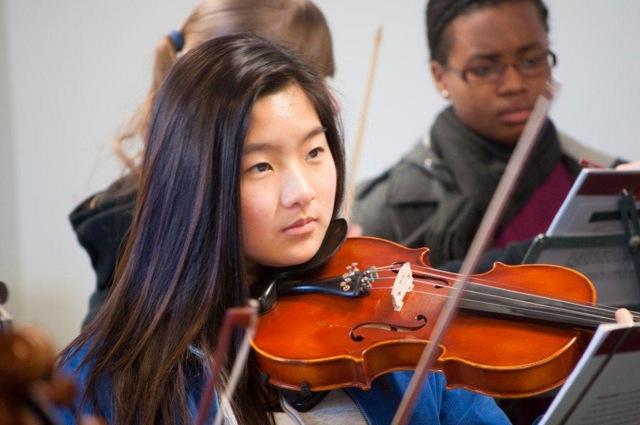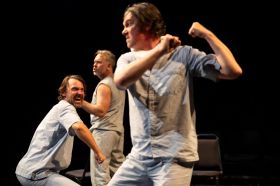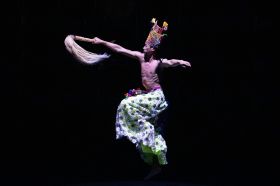“Do you want your violin bridge back?” asked the teenage violinist next to me. Hers had collapsed more than once over the two-day course. When I found time to have a good look at it, it was bent almost semi-circular. There was no way was that bridge ever going to stand up. I suggested that she get a new one made soon. She looked at me blankly.
Then the truth dawned on me—the city we were in had no string instrument shop. The nearest was two hours away in Melbourne. None of the students we worked with had access to new strings, a rehair or even sheet music unless the teacher supplied the lot. The local teacher is excellent but with a teaching circuit that covered five country towns and several hundred miles every week, she had no time to take instruments away for repairs. (I let the girl keep the bridge.)
This young woman is typical of the students whom Orchestra Victoria reaches out to in its education program, On the mOVe, which has been running since 2003. Many of them have never met anyone else their own age who also plays their instrument. Many are home-schooled. Many are taught by someone who doesn’t play their particular instrument and their instruments are often of poor quality. Nearly all of them only began to learn an instrument in secondary school. The education workshop is an exciting opportunity for them to learn and have fun with music specialists.
When Orchestra Victoria was becoming an independently-run company in the late 1990s, an education program was included as an essential component of its identity: the players have professional experience and advantages as city-dwellers that students in the country don’t have, and a duty to pass on our knowledge to the next generation.
Between 2003 and 2011 we have expanded from working in two country centres to ten and have seen a 150% increase in student, teacher and audience numbers. I say country ‘centres’ because the demographic we reach is wide—some students travel several hours each day in order to participate, and in one centre the teachers and students used to book out the local caravan park for the required two days until we realised it would be more sensible to move the workshop to their town!
The conductors are youth orchestra specialists from across Australia, the tutors are permanent and casual members of Orchestra Victoria, who play with the students in the concert. Because the workshops are quite small compared to other music camps around Australia, the tutors are able to keep in touch with the students afterwards. Many have assisted the local teachers by offering lessons in Melbourne or on Skype once a month, and some students have continued on to tertiary music studies and now play as casuals with us. What a great feeling that is to see their progress into the profession!
Our workshops are community-oriented. We serve not only the secondary students but while they are being tutored, our conductors give professional development for their teachers. We often have staff members who want to play with their students in order to brush up on their second or third instrument. The teenagers love to see the adults struggling, then overcoming the same issues they have. We also attend the community orchestra, if there is one, the night before. Having the professional conductor and musicians sit in with them and give tips is inspiring.
On 1December, at Melbourne’s Hamer Hall, On the mOVe students from 2012 showcased their talent alongside Orchestra Victoria mentors. Eighty-four students participated from the eight centres we travelled to this year. The kids were so committed to making it a success and, considering that they had no tutorials and only one 3-hour rehearsal, they sounded great. The audience of 900 thought the concert was amazing. The excitement on stage was so palpable that even the diehard professionals thoroughly enjoyed it. This performance was the first time we had had a grand finale concert in Melbourne, a fitting tribute for our (nearly) 10th anniversary.
The following encapsulates what this is all about. Once I had a young lad in my section whose reactions to learning the music were extremely exaggerated: body flouncing, bow dropping, playing when others were talking. I was concerned that he would disturb the other members of the section. I also noticed his father was present at every orchestral rehearsal, obviously having taken a day off work to be there. The next morning the boy’s father explained that his son had been diagnosed with Asperger’s syndrome and he was there in case his son might suddenly wanted to go home. But on the second day of the program, the father was woken at 6am by his son, already showered and dressed, with the words ‘Let’s go back, Dad. That was so much fun!’
A longer version of this article will appear in the Australian String Association (AUSTA) magazine ‘Stringendo‘ in April.






